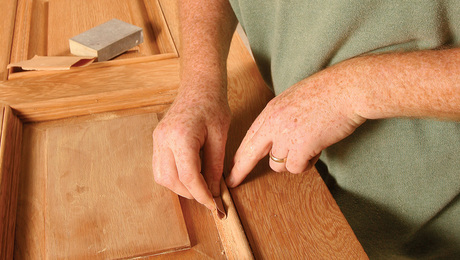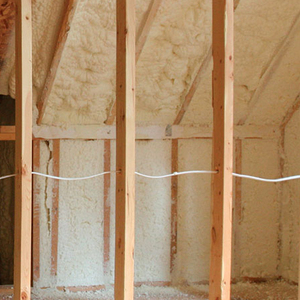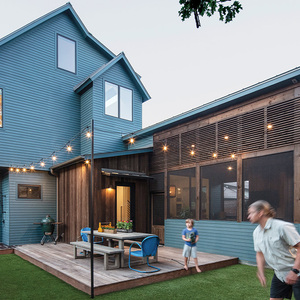*
I am a Builder from Massachusetts. I am preparing to build a home for my own family, FINALLY! We are planning on placing the laundry on the second floor, however, I have heard that the noise of the machines can be overwhelming in the first floor below. Any suggestions on how to sound proof the floor assembly in the area of the second floor laundry?
Thanks for your help!
Discussion Forum
Discussion Forum
Up Next
Video Shorts
Featured Story

From scrapers to power strippers and infrared lamps, there are several methods for removing stubborn paint, each with different costs, time requirements, and health-safety considerations.
Featured Video
Video: Build a Fireplace, Brick by BrickHighlights
"I have learned so much thanks to the searchable articles on the FHB website. I can confidently say that I expect to be a life-long subscriber." - M.K.
Fine Homebuilding Magazine
- Home Group
- Antique Trader
- Arts & Crafts Homes
- Bank Note Reporter
- Cabin Life
- Cuisine at Home
- Fine Gardening
- Fine Woodworking
- Green Building Advisor
- Garden Gate
- Horticulture
- Keep Craft Alive
- Log Home Living
- Military Trader/Vehicles
- Numismatic News
- Numismaster
- Old Cars Weekly
- Old House Journal
- Period Homes
- Popular Woodworking
- Script
- ShopNotes
- Sports Collectors Digest
- Threads
- Timber Home Living
- Traditional Building
- Woodsmith
- World Coin News
- Writer's Digest


















Replies
*
Skip, Here are a few ideas for you....I'm sure you'll get a lot more. First and perhaps most important, get a good drainpan (for under the washer) with a drain line connected to it in case you have a major leak of some sort. Install an easy to use water shutoff behind the machine and shut it off if you're not using the machine . Go down to a HVAC contractor and get some of those rubber, vibration isolating feet that they use under air handling units and put them under your washer and dryer feet. Use cast iron pipe for the drainline. This will eliminate the water gushing sounds when it's emptying. Insulate the walls and floor around the unit. You can really get carried away with this depending on how bad you feel your problem may be...Good Luck!
*Skip, one way to minimize the noise is to start with the washing machine itself. You may have noticed that the premium washing machines are shifting to "front loaders". Striving to keep up with our clients, we added one to our home, and can't get over how smooth and quiet it is. You will save on water and detergent, but the quietness is what we've noticed most. There is none of the "rock&roll" of a top-loading machine, so vibration is virtually nil. We got a Frigidiare ... Asco and Maytag had models when we bought, and by now there are others.The drain pan is a MUST, and I'd encourage stainless steel braided supply line hoses for any washer installation. Lever-type ball valves enable easy shut-off of the supply lines.Sudsingly,Steve
*Skip;I seem to recall an FHB regarding Sound Transmission Coefficients (STC) for floors and walls. That would be a good resource.In addition to the above comments, you nee to isolate the appliances from the structure. There are several ways to do this:A floating floor which rests on loose sand is one way. Using elastomeric products will also work. The ceiling below can be hung on resilent "z" channels. These create a separation between the drywall and the bottom of the floor joists.The equipment itself can be mounted on isolation mounts. Graingers and McMaster Carr in LA are good sources.As you might have guessed, the frequency of the sound, and the mode of transmission are the key factors. High frequency airborne are easily stopped with baffles/insulation. Low frequencies coupled to the flow/structure are tough.Hope this helpsAdam
*One additional option, albeit a bit expensive, is an on/off valve that senses electrical flow to the washer. When current is sensed, the valves open, when current stops, at completion of the wash cycle, the valves automatically close. I installed this, along with most of the other "Safety" items listed by others, just in case...I also studded out the walls to 2x6, this probably doesn't contribute much at all over 2x4, but we stuffed them with batts and isolated the rock from the studs. No complaints.
*To bad someone doesn't make a concrete overflow pan because the added mass - like an inertia pad for big motors - would dampen the vibrations quite a bit. You might fine other ways to do this - like some plain 8X16X2 pavers on a sheet of isolation material (enkomat, fibreglass board) or on ply with rubber isolators. Attacking the noise after the farming is vibrating is usually more difficult.
*There are probably other manufacturers as well, but Watts makes a control valve like this that retails for about $130-$150 depending on who you buy it from. Pretty cheap insurance, considering all the damage hot water can do.
*
The front loaders are appealing for many reasons, but significantly more expensive. The premium might be justified in less expensive framing or other measures to reduce noise.
ABSOLUTELY cast iron or copper waste line. Plastic will be noisy!
*
Rubber isolation pads and mats can be found at Grainger's in any large city. I'd go with a 30" x 60" mat because then you could still use the factory feet to level the units.
Pad between the cast-iron pipe and the 2x6 top and bottom plates with a high density closed cell foam or multiple layers of tar paper or some of that rubber isolation matt.
Affix drywall just inside the regular drywall and 2 x 6 studs in that particular bay to add some (very cheap) mass around the pipe - but don't let it touch the drain pipe.
That FHB with sound deadening ideas was #58, page 54-57, March 1990.
Front loaders are great, now that they finally have tight sealing gaskets. Expensive, but they save 40-60% of the water and therefore energy - potentially $.40/load or $100/year. They are also much more gentle on your clothes - saving your wardrobe and cleaners' bills. You can wash sleeping bags and drapes at home instead of going to the laundromat to use their front loader.
*Has any one used R-Max under drywall ceilings between floors? I once did a basement for people who had a three year old who rode his trike on the hardwood above while mom entertained cliets below. The floor joists were also under sized and we installed bridging to stiffen them, but I think that was for nought. I have often wondered if R-Max between drywall and wood joists would deaden sound. I known it will have no effect on bouncy floors.
*
Skip, et al;
Many local codes require 2x6 (min) framing for any wall with DWV, sealing the plate passages with insulation, and washer pans.
Do not combine the vent stack with any other drain. You would be amazed how much noise is transmitted by vent stacks. You are required to support the DWV by tying to the framing members. Try to isolate the rest of the house from the laundry room walls containing the plumbing, Z-strip is one option.
Do install arrestors (not air columns) on the supply lines. If you use one of those ball valve single handle shut-offs, add another valve on the hot water line. My wife prefers cooler warm water and the single handle units I've seen are not adjustable
Cheers;
JE
*
I am a Builder from Massachusetts. I am preparing to build a home for my own family, FINALLY! We are planning on placing the laundry on the second floor, however, I have heard that the noise of the machines can be overwhelming in the first floor below. Any suggestions on how to sound proof the floor assembly in the area of the second floor laundry?
Thanks for your help!
*
We are currently planning an addition including a second floor laundry/utility room. My plan was always to install a pan or membrane under the whole room then put in a mud bed, floor drain and tile floors and curbs. I figure the mass of 3 or 4 inches of concrete will dampen most of the sound. FG batts, Z channel, heavy framing, and solid wood doors are also standard in all rooms. The rubber isolators are a good touch and certainly can't hurt.
-Rob